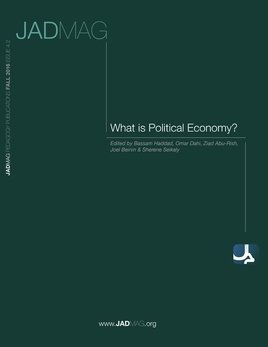 CLICK IMAGE TO ORDER!
CLICK IMAGE TO ORDER!
What is Political Economy?
Edited by Bassam Haddad, Omar Dahi, Ziad Abu-Rish, Joel Beinin & Sherene Seikaly
The brief essays presented here do not present a unanimous perspective, nor was it anticipated that they should. Indeed, several of the authors advance overtly contradictory positions on key issues. Wael Gamal, Bassam Haddad, Toufic Haddad, Adam Hanieh, and Mandy Turner place the epistemology and methodology of political economy firmly within the tradition of Marxian historical materialism and view it as an antidote both to various culturalist and textualist modes of analysis and to globally prevailing forms of domination and exploitation. More pointedly, Max Ajl argues that the central object of analysis for political economy is global capitalism.
Because there is no academic discipline that is dedicated to a wholistic study of capitalism, some authors (Ajl, B. Haddad, Hanieh) explicitly argue that the current disciplinary structure of academia—in particular the division between “politics” and “economics” (and, I would add, “sociology”)—and the concepts rooted in these intellectual and institutional structures subvert the critical political economy we seek to advance. Others (Melani Cammett and Pete Moore) are willing to deploy concepts and methods derived from liberal or new institutionalist versions of political economy. Gamal invokes Antonio Gramsci and Thomas Piketty in arguing that the “experts” of the international financial institutions, relying on mainstream economic analytic tools, will never solve the pressing problems of the Middle East. They regarded Tunisia and Egypt on the eve of the 2011 popular uprisings as “success stories.” Their misjudgments reveal, yet again, that “expertise” is always already imbedded in hierarchies of power.
Aaron Jakes, by way of a critical review of Sven Beckert’s Empire of Cotton: A Global History, argues that a narrow focus on the processes of capitalist production ignores consumption, which is necessarily a matter of culture and taste. Firat Bozçalı, in discussing the very material practices of smuggling oil and other commodities into Turkey from Syria and Iran, similarly draws our attention to the life cycles of commodities, the discourse of legitimation of illegal acts of smuggling, and the work of legal documents and court proceedings in constructing the meaning of smuggling. Jakes and Bozçalı would concur with Ahmad Shokr’s warning that we should not ignore the insights of cultural studies, feminism, and postcolonial theory, lest we expose ourselves to the critiques they so powerfully directed against the “new social history” that emerged in the 1960s and entered Middle East and North African studies in the late 1970s. Jakes suggests that “politically committed intellectual generosity” may help to resolve the impasse created by the clash of culturalist forms of analysis and political economy. Hanieh proposes, following Bertell Ollman and David McNally, the theoretically more difficult proposition that all analytical and social categories are mutually constitutive. This is not at all incompatible with Jakes’ formulation.
Gamal calls for dismantling the discourse of neoliberalism and formulating a counter-discourse. This recalls Karl Marx’s proposition in The German Ideology that, “The ruling ideas are nothing more than the ideal expression of the dominant material relationships, the dominant material relationships grasped as ideas.” However, Marx, who was not as determinist as some culturalists dismissively assert, also maintained, in the introduction to the Critique of Hegel’s Philosophy of Right, that theory (i.e., ideas) can become a material force. Consequently, the outcome of struggles between critical ideas and constituted forms of power is always open ended.
Despite the significant differences among them, the essays, while not unanimous, converge on several points:
1. Political economy is necessarily interdisciplinary, whether conceived as the fusion of distinct disciplines or their negation.
2. The intellectual genealogy of political economy draws on several theoretical traditions, although, as Omar Dahi and others suggest, the central strands of that genealogy run from Marx, to John Maynard Keynes, to Raoul Prebisch, Immanuel Wallerstein and dependency theory, to various neo-Marxian approaches such as the “social structures of accumulation” and “regulation” schools.
3. This intellectual genealogy naturally makes political economy a form of critique of existing disciplinary boundaries, conceptual categories, scholarly conventions, and structures of knowledge and power in the sense that this term was developed from the Frankfurt School to Michel Foucault.
4. Political economy is centrally concerned with institutions, relations of power, and social conflict.
5. Political economy understands the historical formation of capitalism—as a mode of production, a system of circulation and consumption of commodities, and a structure of power—on a global scale. States, markets, and classes must be simultaneously situated in their local, regional, and global contexts. It stands opposed to Eurocentrism and methodological nationalism and must be attentive to the social construction of space, national borders.
6. As Ajl, Gamal, B. Haddad, Hanieh, and Jakes articulate explicitly, but we would all agree, the critical political economy that we envision is allied to a politics of solidarity with our colleagues in the Middle East and with the popular struggles in the region. Let us proceed from these points of consensus.
For more information, go to the annotated bibliography.

